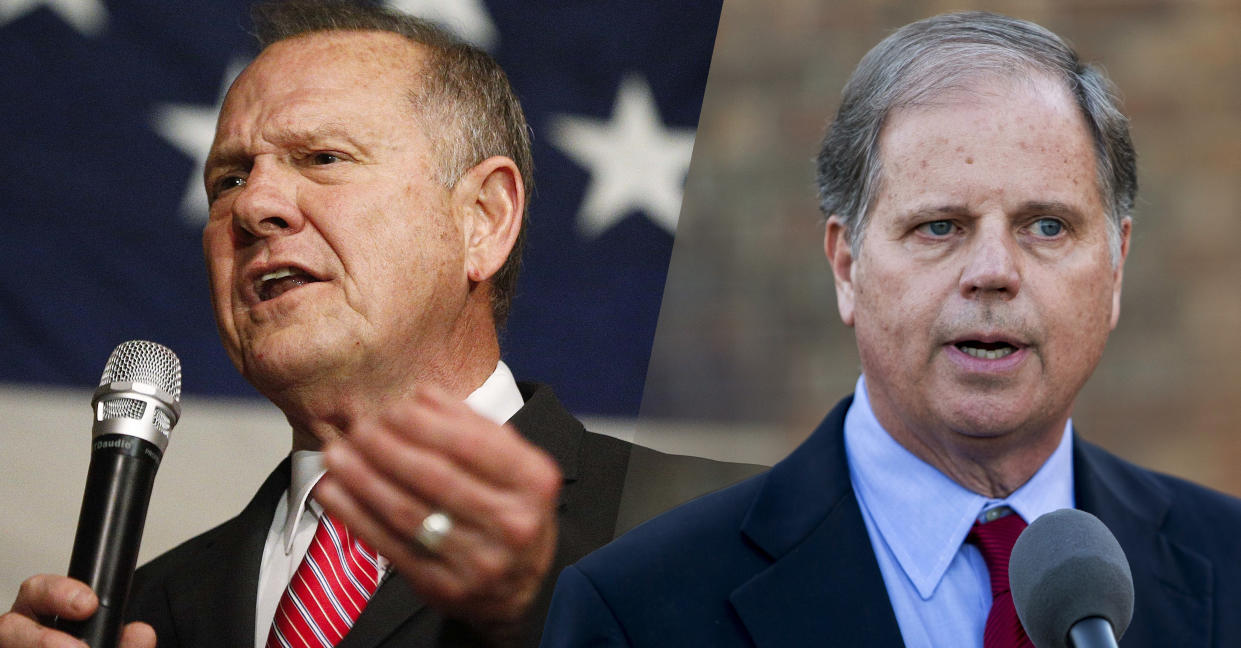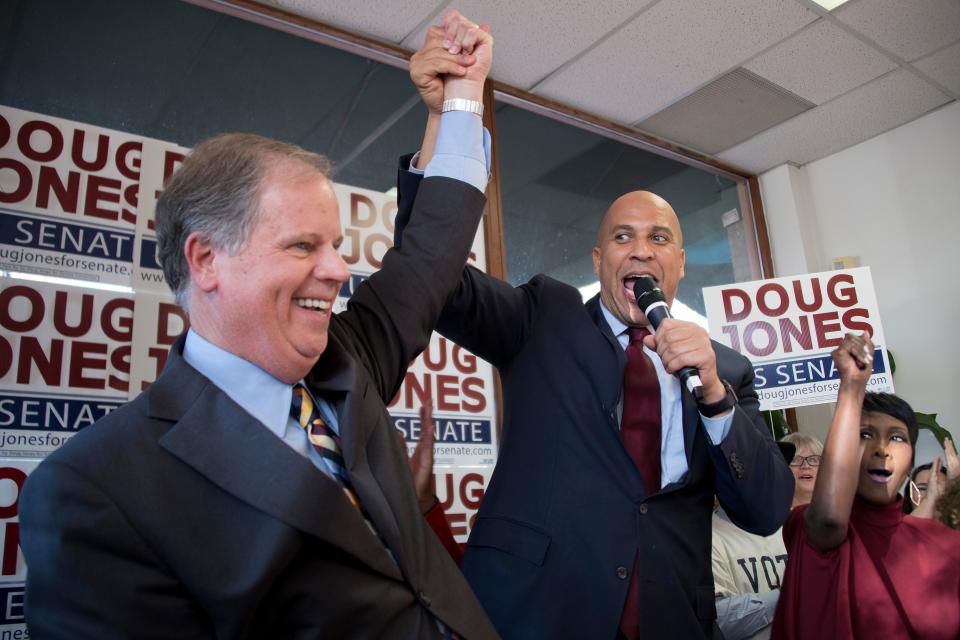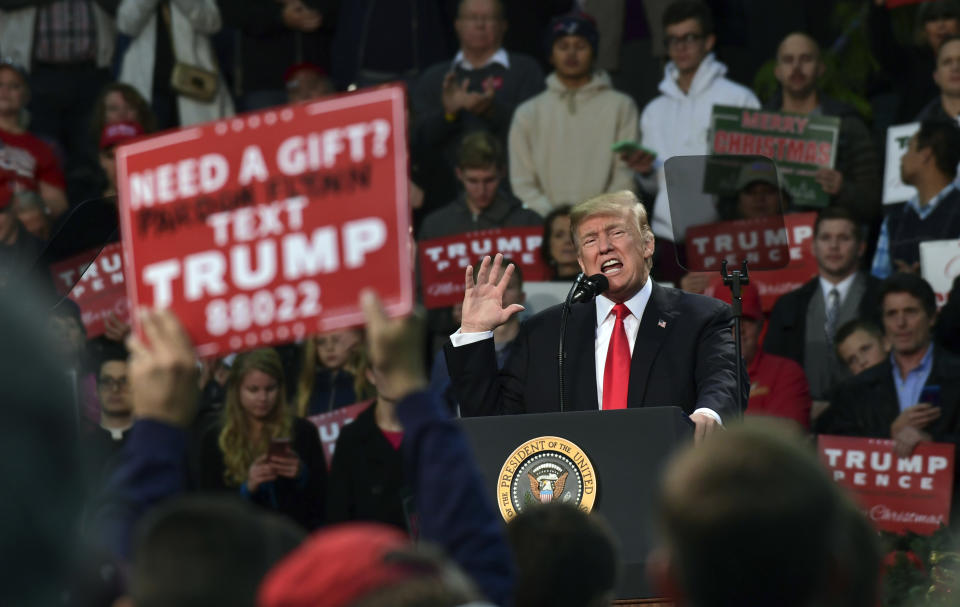Predicting the unpredictable in Alabama Senate race

On Monday morning, Emerson released its latest poll in the Alabama Senate special election, showing Republican Roy Moore ahead by 9 percentage points. That’s disappointing news if you’re supporting Democrat Doug Jones, but you could take comfort in a Fox News poll also released Monday morning, this one projecting Jones to win by 10. Those polls are just the latest reason Tuesday’s special election to fill the Senate seat vacated by Jeff Sessions is as difficult a race to predict as you will ever see. In the deep red state that hasn’t had a competitive statewide contest in years, the polling apparatus are rusty. Election day is a Tuesday in December, two weeks before Christmas, so there are no precedents for projecting turnout. The race pits a former judge who has been accused of pedophilia against a former U.S. attorney who prosecuted members of the Ku Klux Klan, with a thin margin in the Senate potentially getting thinner if the Democrat can pull off a victory that would have seemed unthinkable a few months ago. Below are just a few of the factors that could tilt the results.
The basics
In 2016 Donald Trump won the state with 62 percent of the vote to Hillary Clinton’s 34 percent, a slight improvement for the GOP from 2008 and 2012 when Barack Obama lost 60-38 in consecutive elections. While Sessions ran unopposed in 2014 and won 97 percent of the vote, he took 63 and 58 percent of the vote in his 2008 and 2002 races. Sen. Richard Shelby, who’s represented the state for three decades, hasn’t won below 63 percent of a vote in a general election since initially winning the seat in 1986. (Shelby won his first two terms as a conservative Democrat, but switched affiliation to the GOP in 1994.)
Moore himself has been on the statewide ballot before. In 2000 he won the race to become chief justice of the Alabama Supreme Court by 9 percentage points. (He was elected again in 2012 but was removed from the bench both times.) He twice ran for governor but failed to emerge from the Republican primary both times, earning 33 percent to the GOP incumbent’s 66 percent in 2006 and finishing fourth with 19 percent in 2010. Moore won the Republican primary runoff against Luther Strange, Sessions’s appointed successor, with 54 percent.
Prior to winning the Senate Democratic primary with 66.1 percent of the vote, Jones had not run for elected office.
The scandal
On Nov. 9, the Washington Post published a story in which a number of women said they either dated or were approached by Moore as teenagers when he was in his early 30s and serving as an assistant district attorney. Over the following days, more accusers stepped forward, with former colleagues saying Moore’s affinity for young girls was well-known and that a local mall had allegedly banned him due to his reputation for bothering the teenage girls there. On Friday one of the accusers admitted she had added the location and date to a yearbook inscription she claimed to be Moore’s, which was incorrectly reported by some outlets as an admission she had forged the entire thing. Some of Moore’s supporters have said that Democratic billionaire George Soros is behind all of the allegations, although there is no evidence to support that claim.

Moore — who is known for saying that Muslims shouldn’t be seated in Congress and that homosexuality should be illegal — said in September that America was great when there was slavery because “our country had a direction.”
The GOP candidate seems to be counting on voters to have minimal interest in the issues, as he refuses to discuss them with either his opponent or media outlets. Moore has refused to debate Jones, citing his opponent’s position on transgender rights. He’s also denied interview requests, including one from WHNT-TV in Huntsville in which he was offered an advance look at all the questions focused specifically on policy. Campaign spokespeople have made the rounds on cable news, but the results have not been ideal. Moore has also mostly disappeared from the campaign trail, with limited events compared to Jones’s packed schedule.
The allegations have also cost Moore the endorsement of Shelby, the dean of Alabama’s congressional delegation. Appearing on CNN Sunday, the six-term senator said, “I’d rather see the Republican win, but I hope that Republican would be a write-in. I couldn’t vote for Roy Moore. I didn’t vote for Roy Moore.”
“The state of Alabama deserves better,” Shelby said.
The underdog
Jones made his reputation as a U.S. attorney, including the high-profile and successful prosecution of two Klan members decades after the notorious 1963 Birmingham church bombing that killed four girls. He’s been a successful fundraiser, outgaining Moore by a considerable amount and blanketing the airwaves early with ads. Jones is likely as good a candidate as the Democrats could have nominated, but his pro-abortion-rights position has likely capped his support among Alabama’s large white evangelical population.
The polls
Considering Alabama hasn’t had a competitive statewide race since 2002, it is tough to trust the polling, particularly when it’s difficult to guess what kind of electorate will turn out in a special election. SurveyMonkey published a poll last week explaining that depending on which likely voter modeling you’d like to implement, you could coax a result that was anything from Jones favored by 9 points to Moore favored by 10.
Moore was averaging a 6-point lead in the weeks leading up to the first accusations, with the race tightening in their immediate aftermath. There was a period in late November when Jones became the favorite, but nearly every one of the latest polls show Moore in the lead. However, as FiveThirtyEight pointed out last week, Senate polls are generally unreliable. Of the 2,075 Senate polls in the FiveThirtyEight database taken within 21 days of an election, the average error has been 5.1 percentage points, meaning that nearly all of the recent polls could be wrong in either direction.

The Alabama secretary of state told NBC News that he expects turnout to be “at least 25 percent” after a large uptick in absentee ballot requests. Another factor in turnout is that Alabama is considered one of the toughest states in the country in which to vote. It was a suit brought by an Alabama county that led to the Supreme Court decision that has handicapped enforcement of the Voting Rights Act. Jones has been courting the black vote. African-Americans make up 26 percent of the state’s population, and he will likely need a turnout of at least 27 percent among them to compete. He campaigned over the weekend with high-profile black Democrats including Sen. Cory Booker (D-N.J.), and former Massachusetts Gov. Deval Patrick. Jones has also had the support of Rep. Terri Sewell, an African-American who is the only Alabama Democrat in Congress. Rep. John Lewis, the civil rights icon and congressman from Georgia, endorsed Jones in August.
The Trump effect
The White House held off on endorsing Moore in the aftermath of the allegations, but after the former judge refused to drop out, Trump threw his support behind him in late November. (Trump has been accused by over a dozen women of sexual misconduct, but the official White House position is they are all lying.) While Trump hasn’t officially campaigned for Moore, he held a rally Friday night in Pensacola, Fla., which is near the Alabama border and shares a media market with the southern parts of the state. During his address, the president said, “Get out and vote for Roy Moore,” which comes in addition to a series of tweets attacking Jones and supporting the Republican candidate.

The president remains popular in the Yellowhammer State, with polling September showing his approval-disapproval margin at +23. While this is down from the +36 rating he enjoyed in January, Alabama’s 59.1 percent approval rating in that poll was third-highest in the nation, behind only Wyoming and West Virginia. But Trump was a strong endorser of Strange in the primary — although he attempted to scrub the internet of his positive tweets after Moore won — and Moore still won comfortably.
Read more from Yahoo News:



